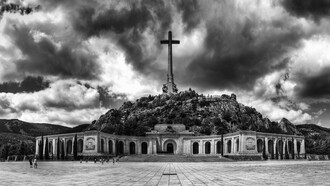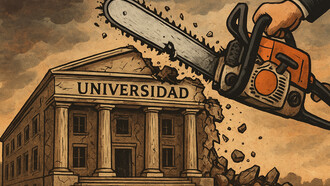Elections for the European Parliament have never raised as much enthusiasm as the legislative elections in the 27 Member States of the European Union. This is inevitable in a way. Not only are 'Strasbourg' and 'Brussels' far away from capitals such as Stockholm and Zagreb, but also this 'Parliament' does not have the same important competences as national Parliaments. First of all, it cannot take any legislative initiatives. Secondly, it shares its decision-making power with the European Council. And thirdly, it has no direct government accountable to it. The European Commission certainly has to report to the Parliament, but it cannot be dismissed as easily as a national government.
Nevertheless, it is a hugely interesting institution. Precisely because the competences are not so direct and clear-cut, political debates are very often much more lively and open. Members of the European Parliament do not feel the urgent pressure from their national parties and are less bound by previously reached agreements by their ministers or party leaders. The mere fact that the Parliament consists of political groups and not of national delegations explains much of this broader space for debates. It means that national interests certainly do not disappear, but that they are subordinated to the political interests of the parliamentary groups. Also, big countries do not necessarily have more power than the small ones, since everything depends on the size of the political groups.
From that point of view, the elections of June 2024 could mean real change and could indeed have real political consequences. The first element to look at is the internal relations of power in the Parliament. For most legislation, a qualified majority is needed. In the past, this was always made up of the two major political groups: social democrats (S&D) and Christian democrats (EPP). Since mainstream political parties are doing less well today, this alliance already had to be broadened with the liberals ('Renew') in 2019, and it remains to be seen what the result of these elections will be. Most surveys indicate that mainstream parties will again be on the losing side, while the far right is expected to win. The Greens may also lose, while the radical left most probably will maintain a status quo.
The far right is on the winning side in many European countries (and elsewhere in the world), but it is internally very fragmented. They now have two different groups in the European Parliament. One is the 'Identity' Group, with parties such as the Rassemblement National from France and the 'Alternative für Deutschland' from Germany. The second one (ECR) is said to be softer, with Fratelli d’Italia from Italy and PiS (Law and Justice) from Poland. They are the least politically cohesive political families in the Parliament, although some of the parties are looking out for changing alliances. However disturbing this growth of the far right may be, the question is whether it will be able to threaten the majority alliance of Christian Democrats, Socialists, and Liberals. Surveys at the end of March suggest it probably will not.
The power relations within the Parliament have to be coupled with the ones in the European Council, which is the meeting of heads of state and governments of the European Union. Contrary to the European Commission, where members are not supposed to have a national identity but to defend European interests, in the Council, national – and political – interests are promoted. It is the similarity or non-similarity of majorities in the Council and Parliament that will make a whole series of nominations for top functions more or less easy.
First of all, the head of the Commission. Most European political parties have a 'Spitzenkandidat,' that is, the person who is supposed to lead the Commission if its political group is winning the elections. Ursula von der Leyen, the current head of the institution, is a candidate again, though it is not sure she can win. Her party surely will be the biggest once again, but she was not the Spitzenkandidat in 2019. She got the post because the Council did not like her party’s one, which again shows the power of the national governments. It is now said that von der Leyen does not even have the full support of the whole European People’s Party. Moreover, she will also have to convince a majority in the Parliament.
Other nominations follow from this first one. First, the President of the European Council itself. This is a more facilitating function, though it is highly visible as the 'face' of the European Union. Further, the chairman of the European Parliament and the High Representative for Foreign Affairs and Security Policies. For all these high offices, a delicate balance must be achieved between nationalities on the one hand and political affinities on the other.
The third factor that has to be looked at for an assessment of the new Parliament will be the balance of power regarding the geopolitical position of the European Union. Times have changed dramatically since the last elections of 2019, and even if the European Parliament has no real competences in matters of foreign relations, it does have influence. First of all, one has to look at the Eurosceptic parties and groups. At the radical left, this influence has waned, since there is an awareness that in all Member States a majority of the population is in favor of membership in the European Union. At the far right, the situation is different, and even if some parties, such as the French Rassemblement National, are not openly 'anti-Europe' and 'anti-Euro' anymore, enthusiasm for membership is not very lively either.
At this moment, it is mainly Hungary which systematically takes an anti-EU position in the Council. The Green group has always been very much in favor of European policies, but with its important German delegation, it has also become the most outspoken advocate of an armed 'solution' in Ukraine. The most important dividing line at this moment concerns indeed the security policies of the European Union, much more than the favorite topic of the far right, migration. At this moment in time, talk is about a 'war economy' and more support for Ukraine. If many progressive forces have always criticized the market focus of the European Union, they now are not necessarily happy with the shift towards defense which inevitably will be coupled to austerity policies in other sectors.
According to some, the European Union can only survive as a peace project, what it has always claimed to be, and not as a NATO subsidiary. However, politics do not point in that direction, with some political leaders even speaking of NATO troops on the ground in Ukraine. Peace negotiations have stalled, probably because the risk of their succeeding has been too great. The war needs to go on to justify the expansion of the U.S. and EU military industries. Total military spending by NATO, which is supposedly a 'defensive' alliance, has reached an all-time high of USD 1,100 billion in 2023 while military spending by Central and Western European countries as self-declared champions of democracy and peace is also at its highest ever, i.e. USD 345 billion already in 2022 according to SIPRI. By comparison, Russia, a dictatorship that is directly involved in war, spent USD 86.4 billion on the military in 2022 according to SIPRI.
Without any doubt, this is the most important political decision to be made for the European Union and should be at the center of all electoral debates. In almost all Member States and at the level of the European Commission, social policies once more will be budgetary victims of the new priorities, while environmental policies that are so extremely urgent are also put into the fridge. In that way, the disaster might not only come from future wars but also from ecological decline and even social upheaval. The remaining Welfare States are bound to be dismantled, so it seems. Add to this the fact that the German-French political tandem of the European Union is broken because of security policies in general and Ukraine more specifically, and one sees the future of the organization has become very unsure.
Since the beginning of the crisis, many voices have been pleading, once again, for a more autonomous role of the European Union, away from Atlanticism and NATO. The road that has been taken these past years has been different. It has always been said Europe only makes progress thanks to the crises it faces. This time, the crisis can have other consequences. Europe has always boasted its 'values' of democracy and human rights, but precisely with the two major wars going on at the moment, Ukraine and Gaza, it becomes clear these values are far less universal than they were said to be. With its sanctions on Russia and its support of Israel, the European Union with its double standards has lost its moral authority and its positive voice in the world.
If only electoral debates could be focused on this perverse development, they could have a healing power. Again, the European Parliament has only very limited competences in terms of foreign relations, but the result of the elections could point to the direction its population wants to go. Much will depend on the participation of the populations in the elections. In 2019, it was 51%, while in 2014 it was only 43%...















